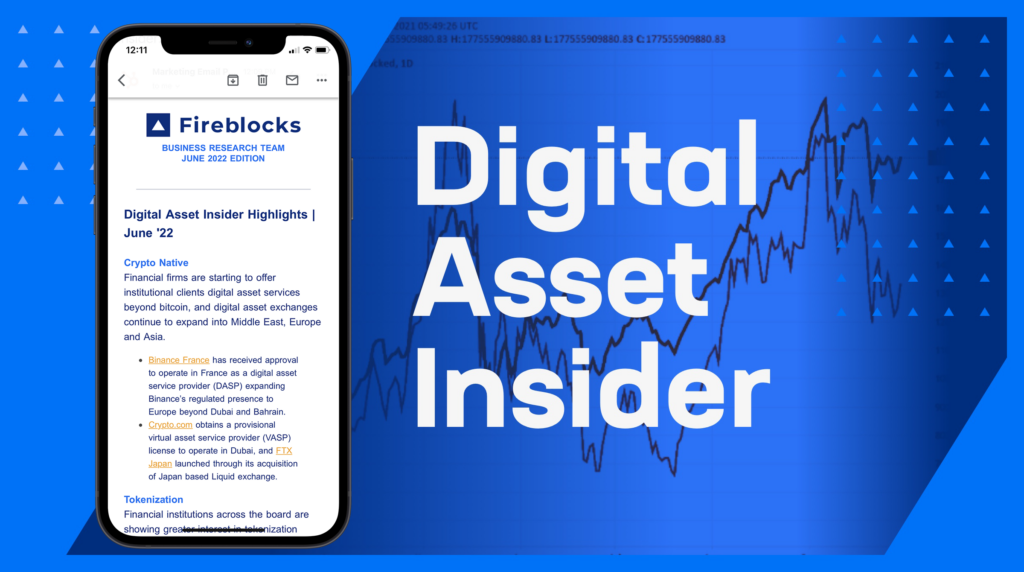May was a difficult month for the digital asset space, but despite all of the volatility, investments into blockchain technologies continued to be developed and rolled out. Regulators are taking steps to introduce regulation around stablecoins, and are continuing to focus on protecting users from hacks. Checkout.com also became the first PSP to launch a settlement solution that allows automatic fiat-to-stablecoin conversion for its merchants, powered by Fireblocks.
Crypto Natives
Financial firms are starting to offer institutional clients digital asset services beyond bitcoin. The United States Securities and Exchange Commission (SEC) provided guidelines on the requirements for spot-based exchange traded fund (ETF) to be approved. Digital asset exchanges continue to expand their licensed footprint in the Middle East, Europe and Asia, as well as expand their range of financial services offered to their users.
- Fidelity Digital Asset Services (Fidelity Digital) is expanding its institutional investor services to include ethereum trading and custody in addition to bitcoin. Fidelity Digital plans to hire 110 engineers and developers with experience in blockchain, and another 100 focused on customer service.
- The United States Securities and Exchange Commission (SEC), has not approved a spot-based bitcoin exchange traded fund ( ETF) despite continued applications being filed (One River) or refiled (ARK 21Shares). A guideline has been issued by the SEC on what would allow one to be approved, “An exchange that lists Bitcoin-based exchange-traded products can meet its obligations under Exchange Act Section 6(b)(5) by demonstrating that the exchange has a comprehensive surveillance-sharing agreement with a regulated market if significant size related to the underlying or reference Bitcoin assets.” It remains to be seen how applicants will respond.
- Binance France has received approval to operate in France as a digital asset service provider (DASP) expanding Binance’s regulated presence to Europe beyond Dubai and Bahrain. Meanwhile, Crypto.com obtains a provisional virtual asset service provider (VASP) license to operate in Dubai, and FTX Japan launched through its acquisition of Japan based Liquid exchange.
- Australian exchange Swyftx will be the first Australian based exchange to offer interest bearing yields with no-fees. The Australian crypto exchange traded funds (ETFs) that were delayed in April finally launched on May 12th – ETFS 21Shares Bitcoin ETF (EBTC), ETFS 21Shares Ethereum ETF (EETH), and Cosmos Purpose Bitcoin Access ETF (CBTC).
Tokenization
Advances made in blockchain technology can give developing nations and their economies the ability to “leapfrog” ahead and enable access to their resource rich markets in a transparent and low cost way. Traditional finance firms are taking steps to also leverage tokenization technology internally, and are gaining valuable insights into how it can be used to gain efficiencies and cost benefits.
- The Central African Republic (CAR), having adopted bitcoin as legal tender in April, is proposing to tokenize access to the country’s natural resources. The country is a leading producer of diamonds, but they have a range of other mineral deposits such as cobalt, gold, copper, and graphite, largely untapped. President Faustin-Archange Touadéra is looking to create more investment opportunities for foreign investors, and spur economic development with blockchain technology adoption as a catalyst.
- JPMorgan has tokenized money market shares that were used as collateral using its private blockchain between two of its own companies. The tokenized collaterals can include other financial instruments such as equities and fixed income. They can then be used for transactions that involve derivatives trading and securities lending.
Web3
Decentralized finance is finding interest from Singapore’s central bank with a pilot focused on permissioned liquidity pools. AML and KYC/KYT is a concern for many regulators when it comes to DeFi markets and their users, which had initially been designed to be open and not rely on centralized trust. Non-crypto native use cases continue to be explored to determine how tokens can be used to increase participation and engagement.
- Fireblocks announced the launch of their Web3 Engine, the first and only enterprise-grade platform for developers building the next generation of NFT, GameFi, and DeFi products. With this engine, developers can easily build dApps on top of Fireblocks’ tech stack or securely access the full range of existing web3 applications.
- The Monetary Authority of Singapore (MAS) announced a decentralized finance (DeFi) focused pilot, Project Guardian, led by DBS Bank, JPMorgan and Marketnode involving a permissioned liquidity pool of tokenized bonds and deposits. There will be four areas of focus that include open and interoperable networks, trust anchors, asset tokenization, and institutional-grade DeFi protocols.
- Social tokens are initiated by non-crypto natives, like creators, to form ecosystems that reward community members for their participation and engagement. Community members will be able to use their social tokens to transact in both real and digital marketplaces. CoinDesk’s relaunch of their social token DESK is an example of how crypto news publishers can foster a direct relationship with their audience.
Digital Asset Infrastructure
Fintech firms are evolving their business models by partnering with blockchain protocols to allow them to operate within the new digital asset ecosystem and provide their existing customer base access to the benefits and gain new customers. Investments into crypto-focused start ups continue to flow as they seek to provide the necessary solutions that existing financial systems are not able to adapt to.
- Checkout.com has rolled out a settlement solution based on stablecoin using a new digital asset payment technology by Fireblocks. The solution allows 24/7 settlement for merchants with automatic conversion between stablecoin and fiat currency initially starting with USDC and U.S. Dollars.
- Money-transfer service firm Moneygram is partnering with the Stellar blockchain protocol to launch a platform allowing users to send stablecoins and convert them to fiat currency. The platform will reduce transfer fee costs and speed up transactions.
- Institutional-grade digital assets trading infrastructure company, Elwood Technologies Services (Elwood), raised $70 million led by Dawn Capital and Goldman Sachs in a Series A funding round. Funds will go toward expanding Elwood’s product offerings and its global operations. Elwood’s order management system, execution management system, and portfolio management system, provide users low-latency connectivity to global crypto exchanges and deep liquidity.
Regulation | Regulators
Digital asset firms are working together to come up with a solution to meet compliance standards addressing anti-money laundering concerns. Regulators are taking more steps to introduce regulation around stablecoins, their legal status and therefore acceptance as legal tender. Retail investor protection continues to be raised as the main concern for regulators.
- The Travel Rule requires the originators and beneficiaries of all transfers of digital funds to exchange identifying information. A group of crypto companies including Coinbase, BitGo, Gemini, Kraken and Fidelity, formed Travel Rule Universal Solution Technology (TRUST), to build an anti-money laundering (AML) system for cryptocurrency transactions. TRUST works by guaranteeing no central storage of customers’ personal data, while using a system of digital signatures between VASPs to ensure the correct address is being used in bi-lateral data sharing channels.
- Japan’s Financial Services Agency (FSA) has passed legislation that defines stablecoins as digital currencies, imposing a mandatory link with the yen and the right to redeem them at face value. The issuance of stablecoins will be restricted to banks, trust companies and certain licensed money transfer agents.
- Federal Reserve Governor Waller, called for more regulation to protect the retail investor participating in the crypto sector at the SNB-CIF Conference on Cryptoassets and Financial Innovation in Switzerland. The intention of regulation is not to protect high net-worth investors from losses, but to stem the losses of investors with limited resources, and to limit the spread of financial stress.
CBDCs
Central banks’ mandate to ensure financial system stability continue to be top of mind as they look for ways to create a retail CBDC, and gain the efficiencies and benefits of a digital currency based on blockchain technologies.
- In a Bank for International Settlements (BIS) paper, Fabio Araujo, an economist at the Central Bank of Brazil (CBB), revealed that the central bank will have greater control over the population’s money, the ability to halt bank runs, and impose other restrictions on citizens’ access to money when needed.
- Thailand’s central bank, Bank of Thailand, has delayed the pilot of their retail central bank digital currency (CBDC) until the fourth quarter of 2022. The pilot intended to test deposits, withdrawals and transfers, and the central bank wants to have both banks and non-banks involved in the end-to-end process of the pilot.
- Varun Paul joins Fireblocks as the director for CBDCs and market infrastructure. Paul previously was from the Bank of England as head of the fintech hub. In his new role, Paul will be focused on supporting the digital asset strategy of central banks and firms developing market infrastructures using blockchain related technologies such as tokenization.
ESG Impact
With more focus on the carbon credit markets, existing players are tightening up their requirements for the use of both existing and new carbon credits issued. Traditional finance is forming partnerships with carbon standard setting organizations and funding carbon focused ventures as the move towards net zero in 2050 gains momentum.
- Verra announced in a press release that it will prohibit the creation of crypto instruments and tokens based on retired carbon credits and will seek public consultation on ways to immobilize credits in accounts in the Verra Registry.
- Malaysia’s stock exchange, Bursa Malaysia signed a memorandum of understanding in May with Verra to establish a Voluntary Carbon Market (VCM) ecosystem. The VCM will allow participants to trade standardized contracts of high quality carbon credits based on the Verified Carbon Standard (VCS) Program.
- Former WeWork chief executive officer Adam Neumann’s start up, Flowcarbon raised a total of $70 million to develop its carbon credits platform. Venture capital funded $32 million with the remaining $38 million from the sale of the Goddess Nature Token (GNT).
Crypto-Native Market Analytics
May was a difficult month for crypto-native tokens. The market suffered an attack on confidence with the unraveling of decentralized finance protocol Terra’s algorithmic stablecoin UST and with it LUNA, Terra’s native token. Debate will continue on what led to Terra’s untimely demise, but what is clear is that market participants need to carefully manage their exposure and risk in these emerging markets.
Observers of the Terra event noticed that the contagion did not negatively spread to the whole of DeFi, in that other protocols and their dApps did not similarly crash. Participants should seek to review their criteria for participating in DeFi markets, and either take confidence in their investment and risk processes where they worked; or take steps to improve it where they did not.
CHART OF THE MONTH: U.S. Dollar Stablecoins Part II
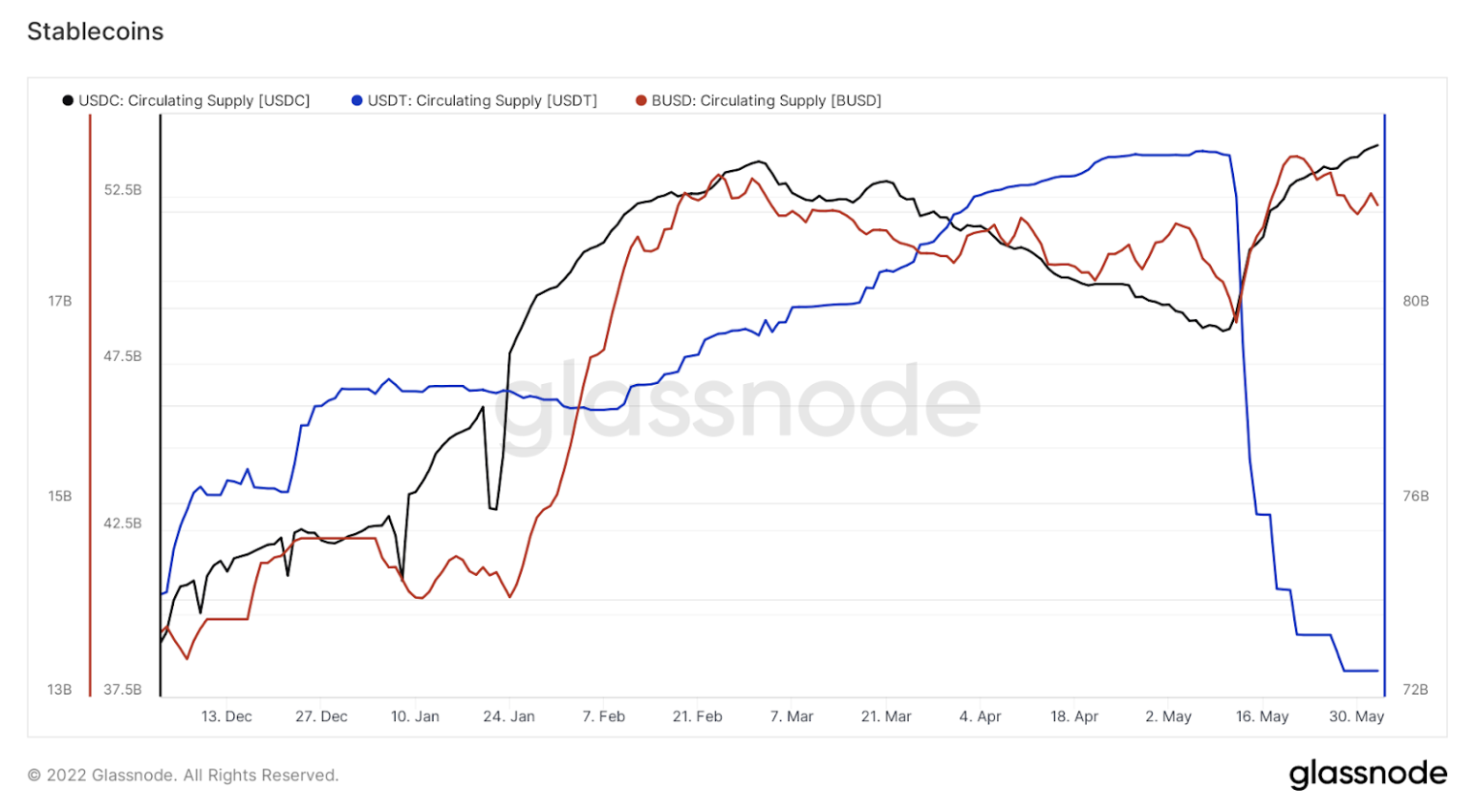
Supply of collateral backed stablecoin tether (USDT) fell in May, which some commentators attribute to the knock-on effect of the depegging of algorithmic stablecoin terraUSD (UST).
USDT lost parity from the U.S. Dollar momentarily but has since recovered its peg.
MONTHLY CHANGE
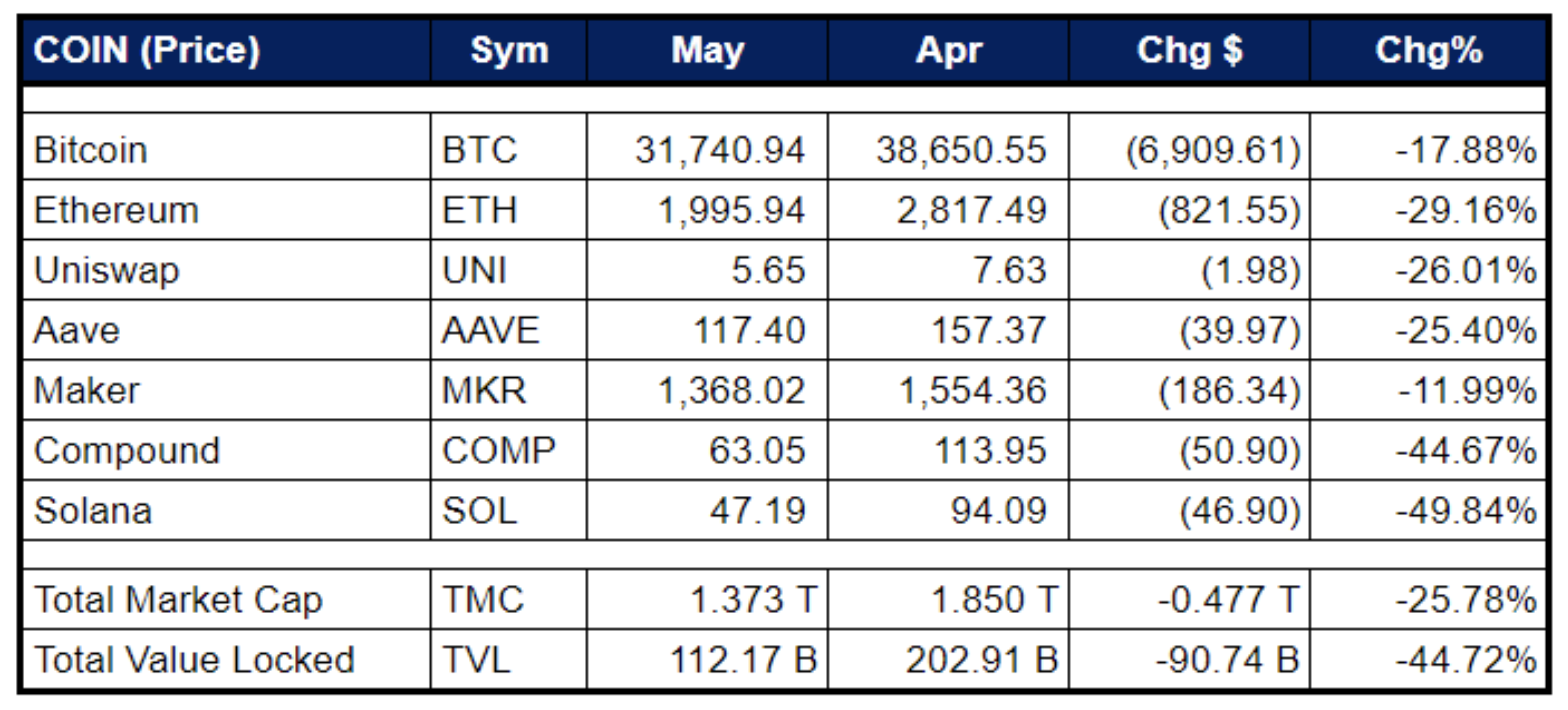
Most of the crypto-native markets fell on broad aversion to risky assets and rising interest rates.
TOP 10 MARKET CAPITALIZATION
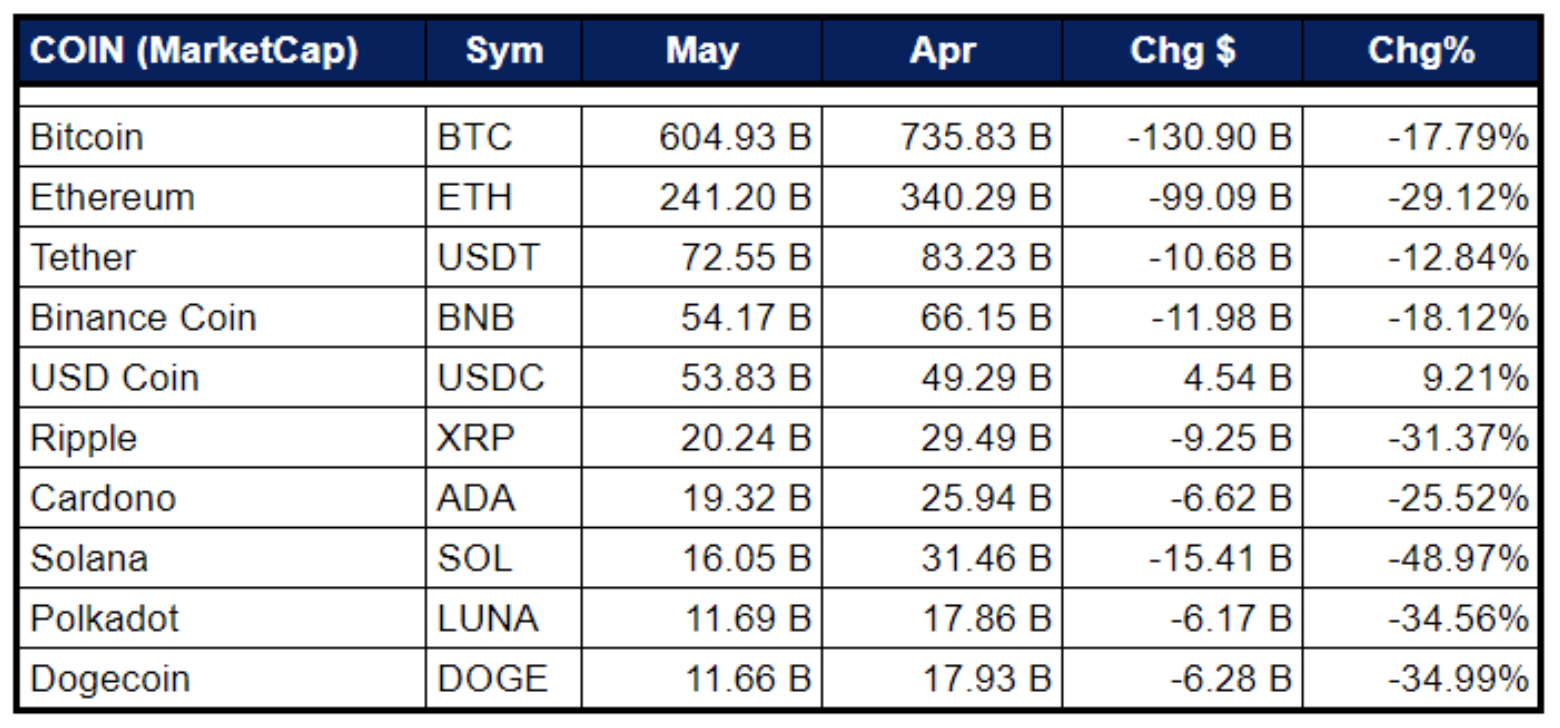
Digital asset markets continued lower in May for crypto-native markets.
BITCOIN [BTC]
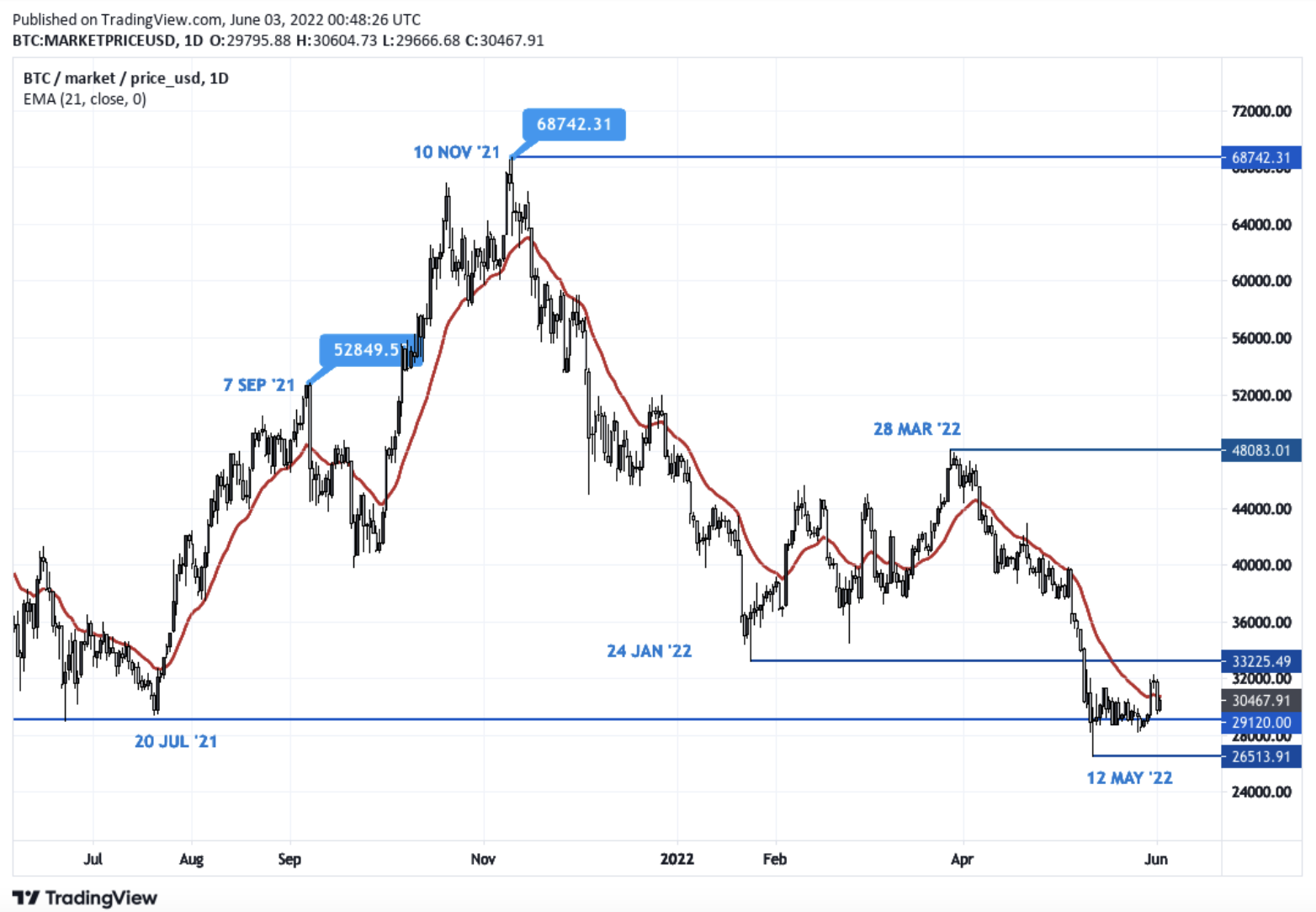
Bitcoin moved past the low set on 24 Jan at $33,225 and the prior low range that had multiple tests around the $29,000 area in the prior 12 months.
ETHEREUM [ETH]
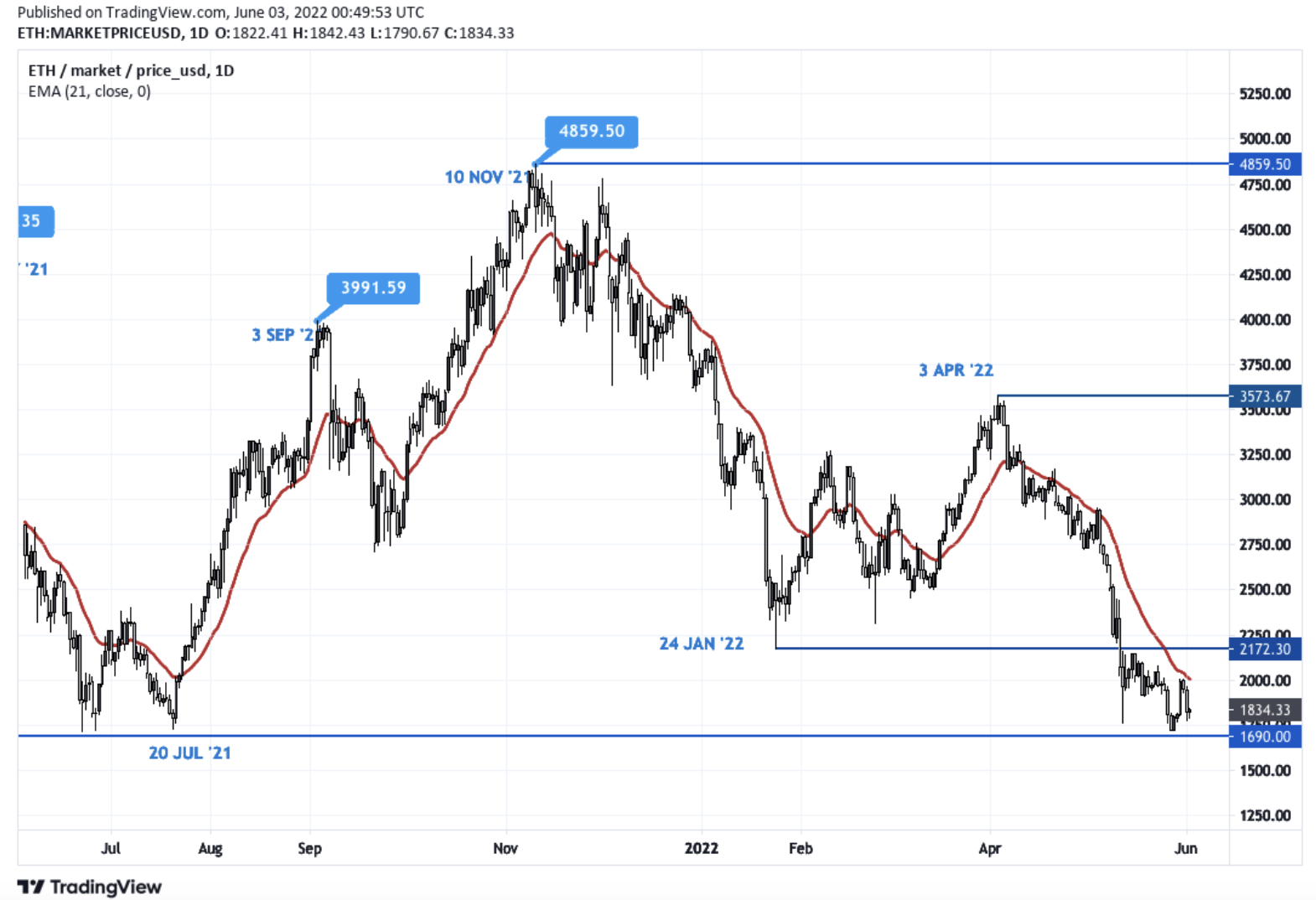
Ethereum broke $2,172 and further weakened toward the support range around $1,700 that had been tested multiple times in 2021.
BITCOIN : STOCK TO FLOW RATIO [BTC:STFR]
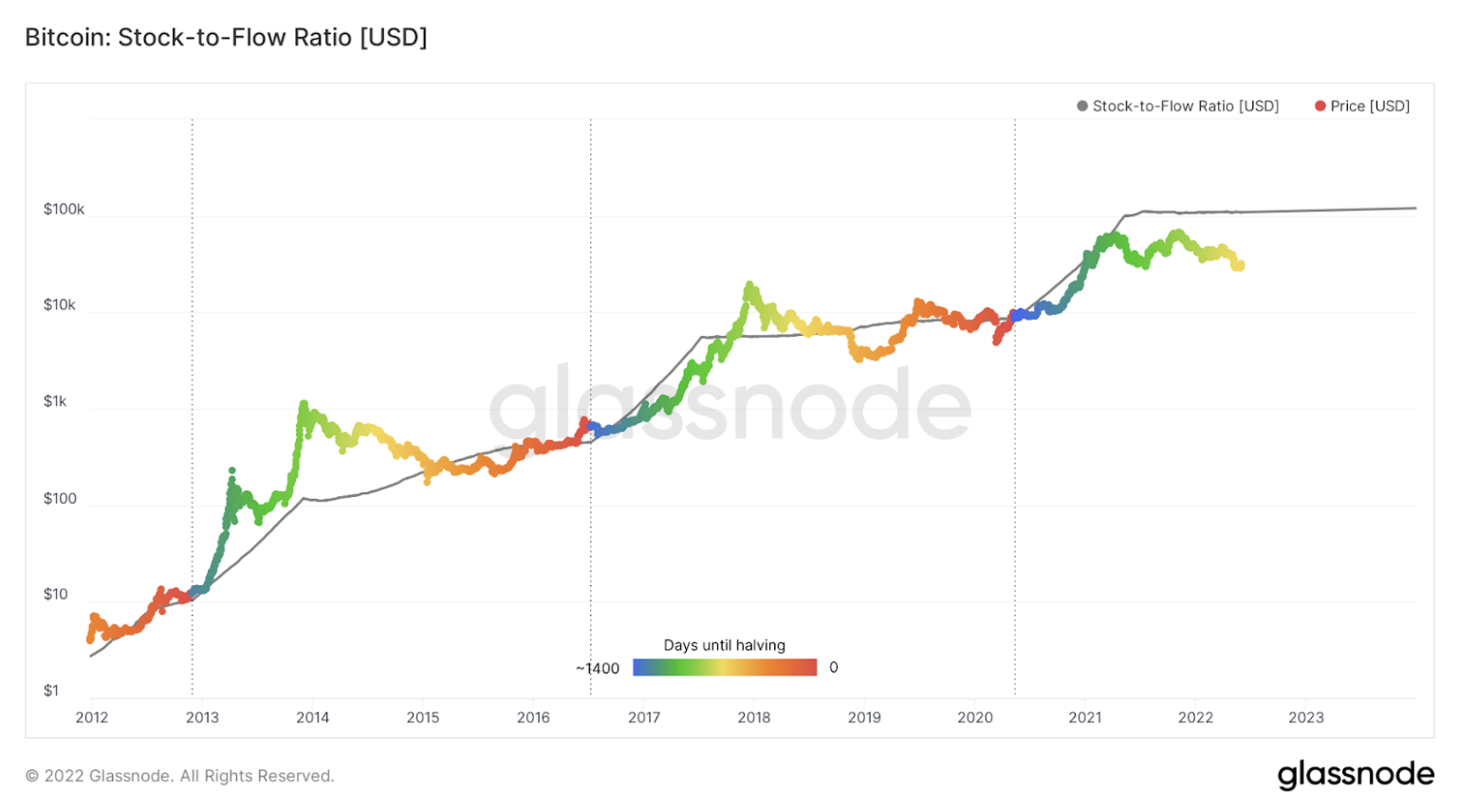
BTC is lower than STFR, indicating it is undervalued.
BTC: ALL EXCHANGES NETFLOW
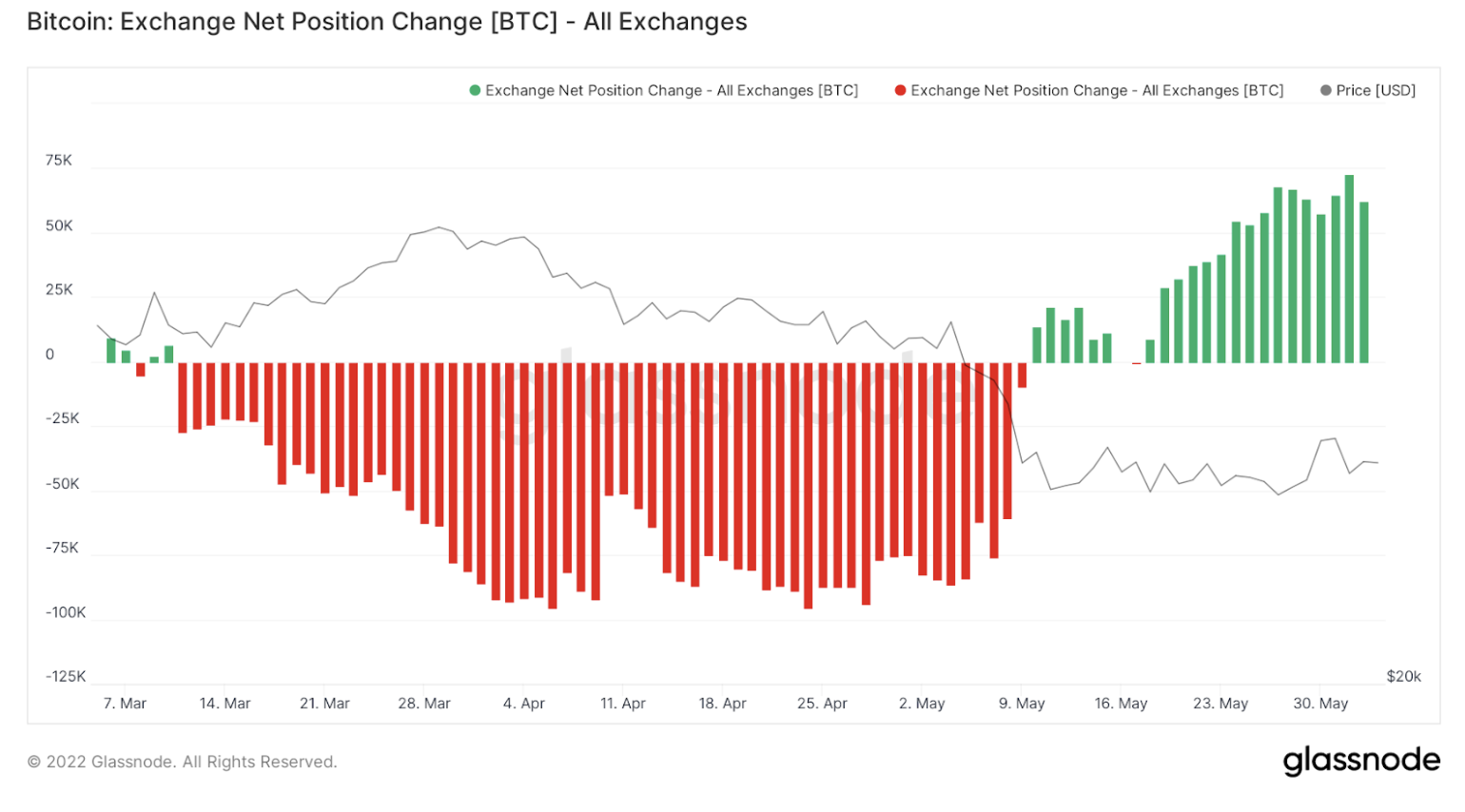
After months of net outflows, May saw net inflows into exchanges even with BTC price falling. This could indicate investors taking advantage of the low BTC price not seen since July 2021.
REGIONAL BTC FLOWS [Last 7 Day Average, Jun 3]
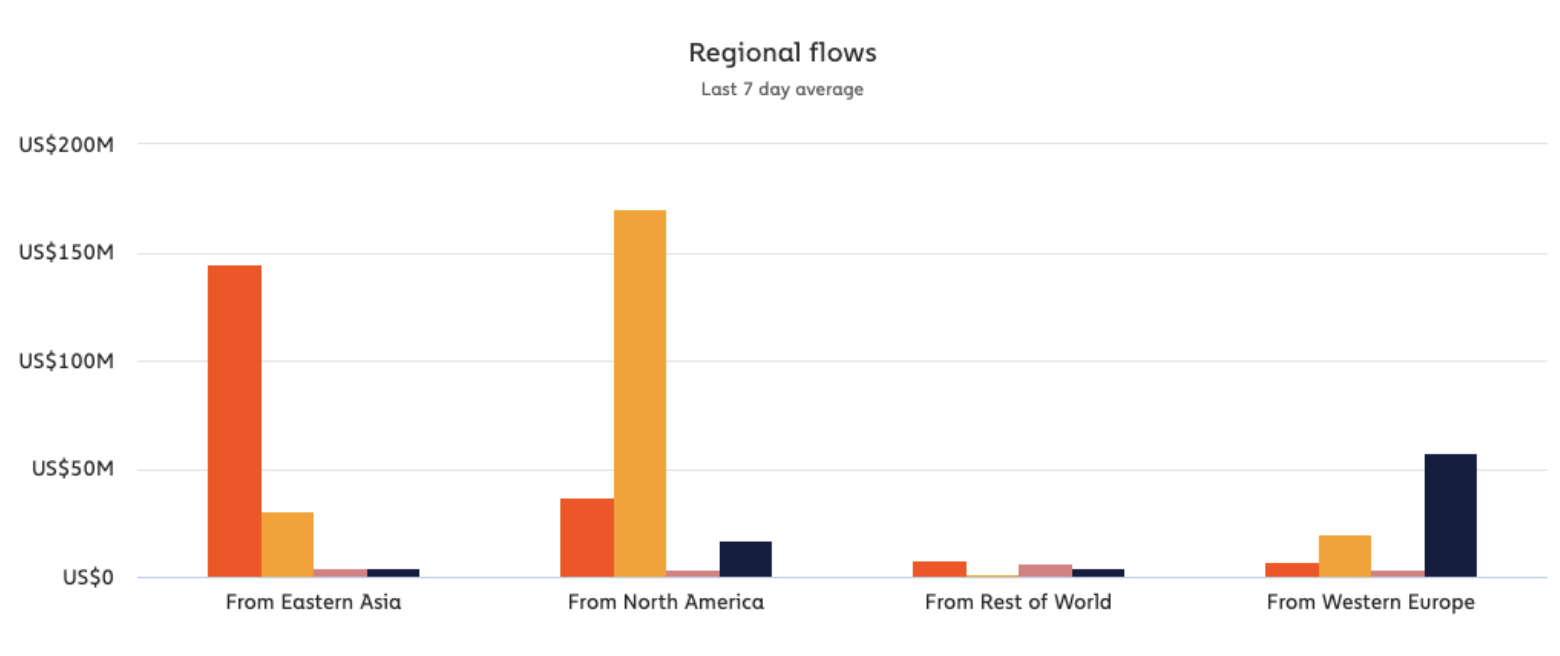
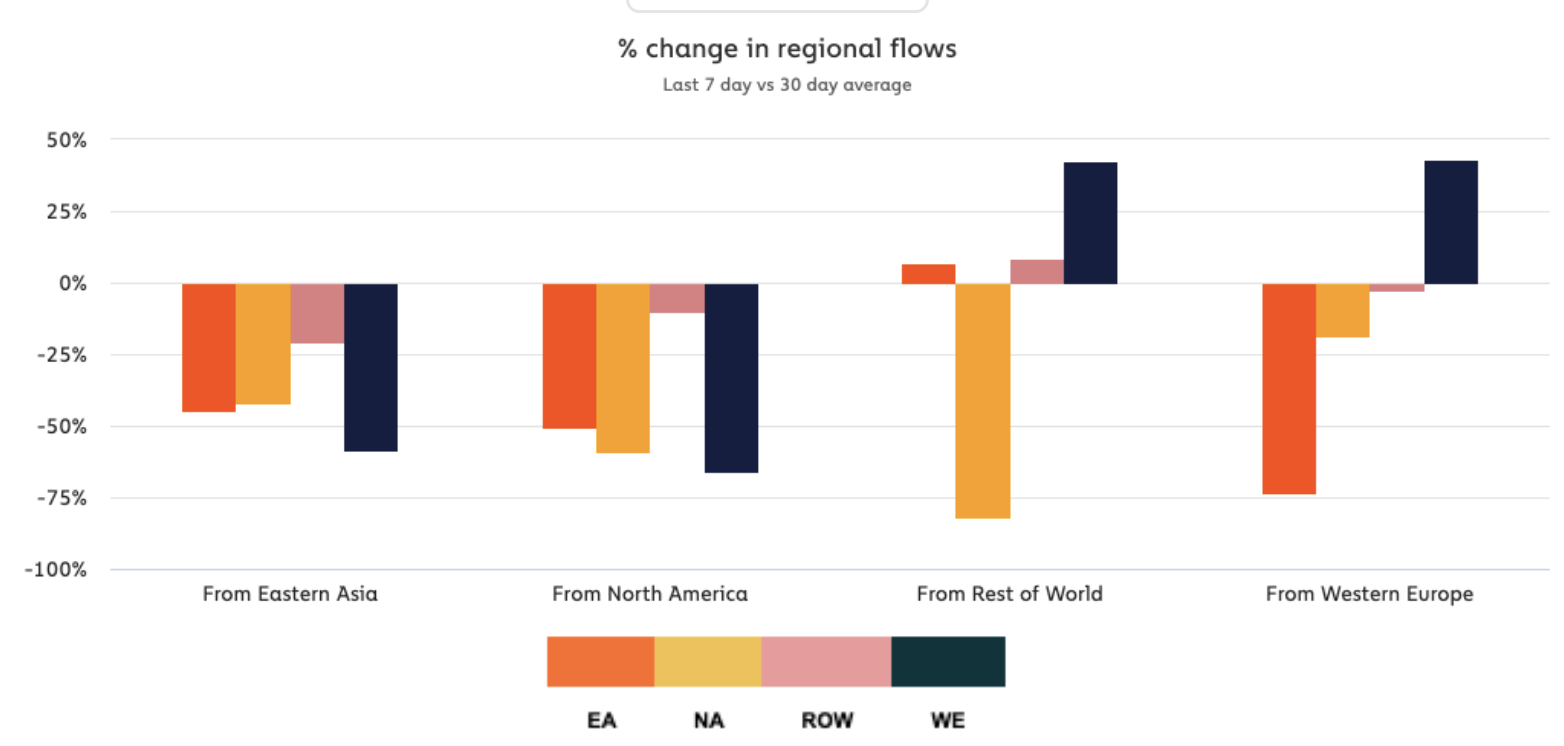
Intra-regional flows dominate in all regions.
Falls in flows from a percentage change perspective was the greatest with North America and all the other regions. East Asian flows to Western Europe fell the most.
Assets typically flow within a region, likely due to preferences for local exchanges, but flows between regions often occur as a result of regulatory concerns, geopolitical changes, or significant market price variations.
TOTAL VALUE LOCKED [TVL, May 31]
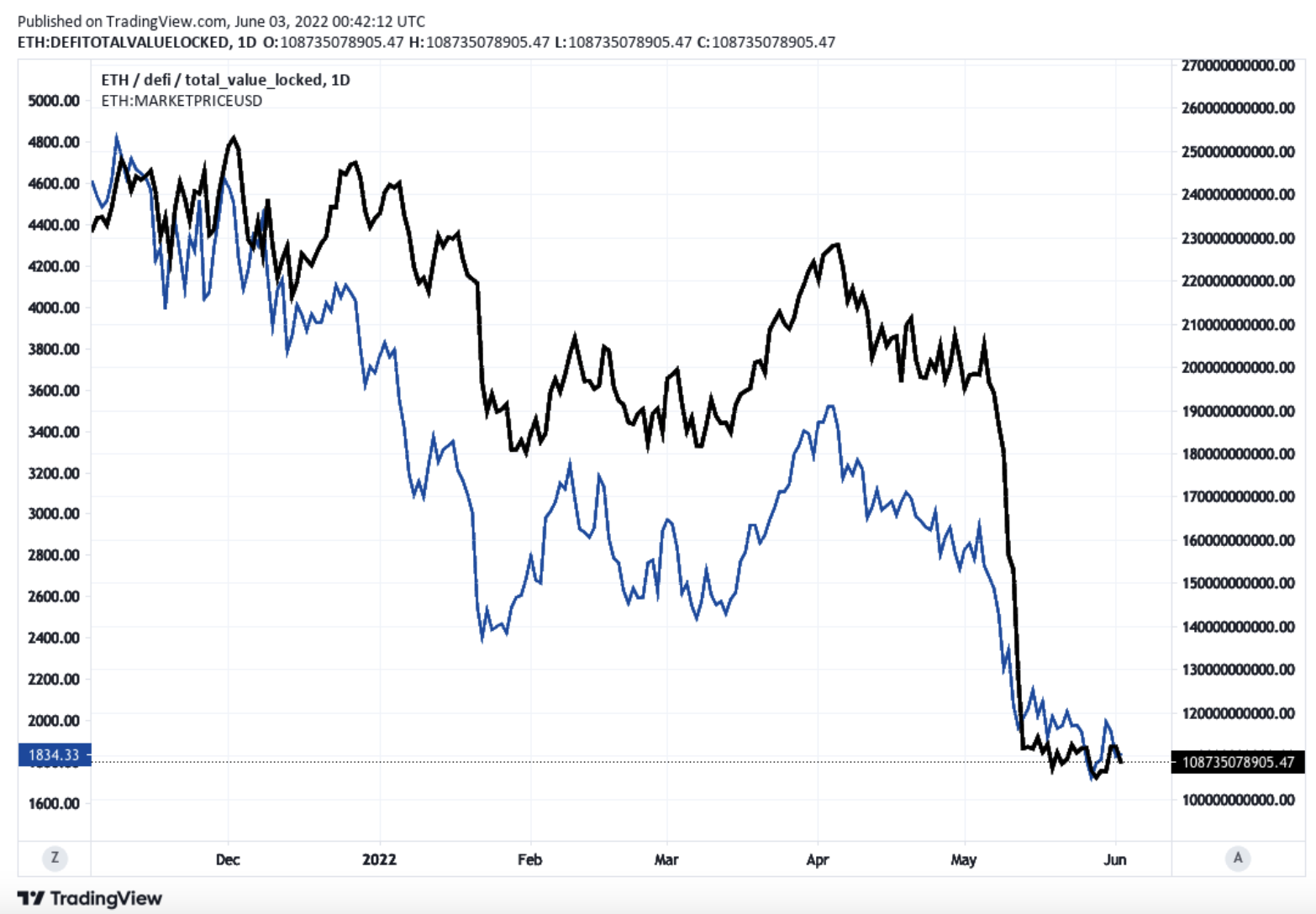
DeFi TVL fell along with the fall in ETH and Altcoin prices.
PROTOCOL POSITION [TVL, May 31]

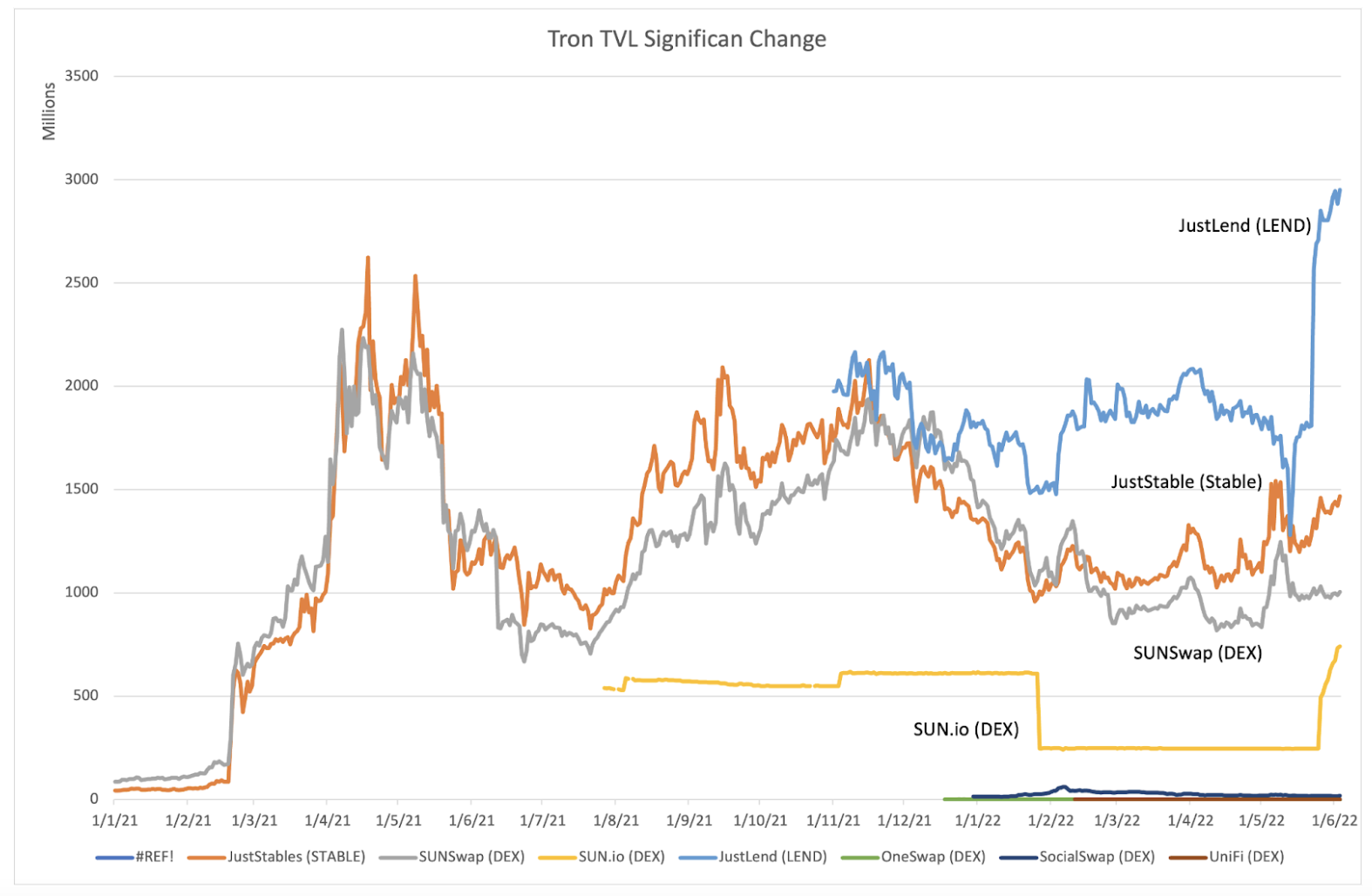
With the exception of Tron, Total value locked (TVL) for the other four protocols ranking behind Ethereum in terms of TVL fell in what has proven to be a tough month in May.
Tron lending application, JustLend, was the significant contributor to the protocols higher TVL with over $1 billion being locked during the month, a 59% increase month on month, and another $411 million by Sun.io which is an integrated platform for yield farming, swapping tokens, and self-governance.
DEFI PULSE INDEX [DPI]
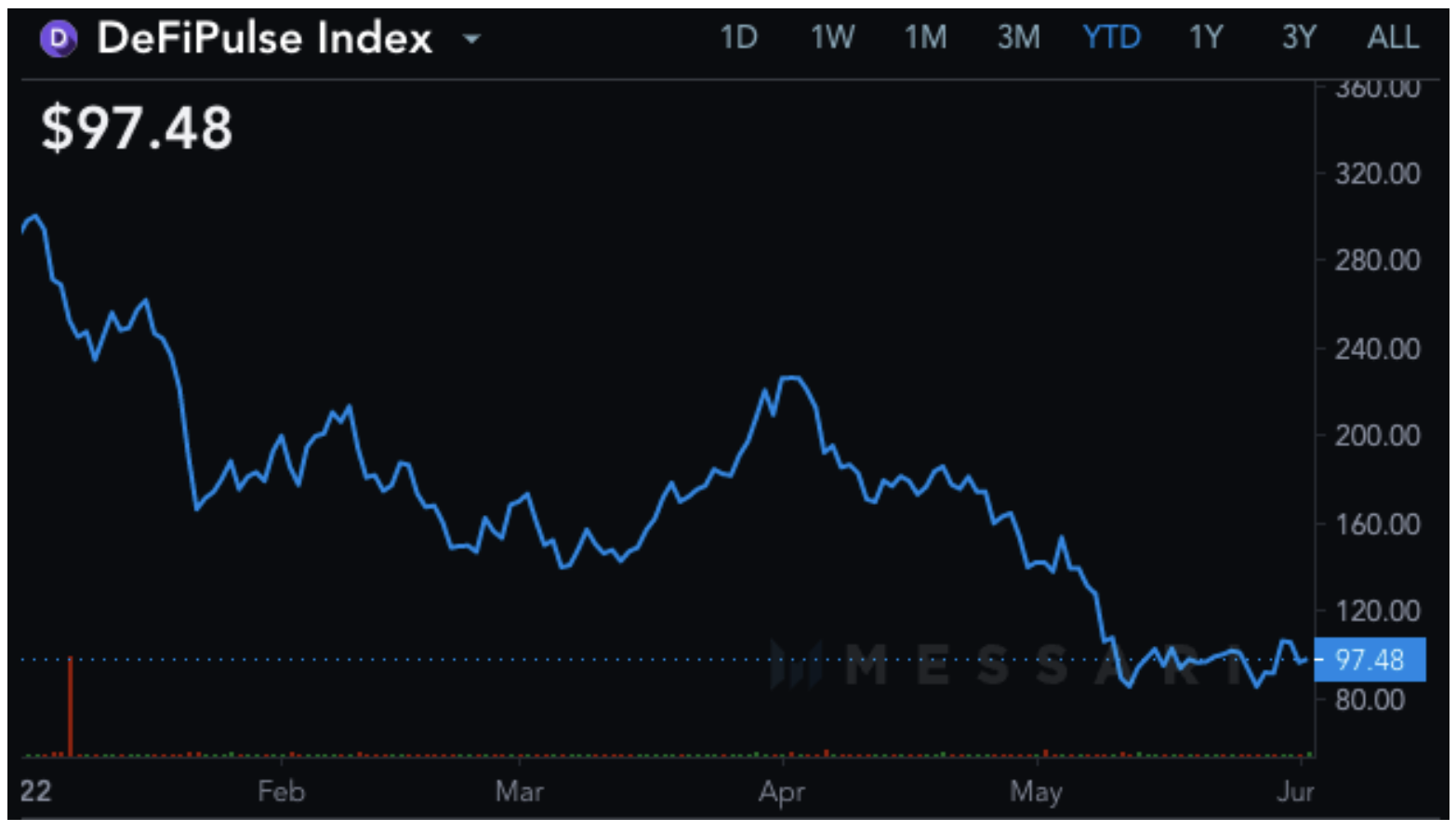
Top 5 Tokens: Uniswap, Aave, Maker, Loopring and Synthetix.
Index information can be found at the Tokensets.com.
This reCap is distributed for general informational and educational purposes only and is not intended to constitute legal, tax, accounting, or investment advice. For other important disclosures.



